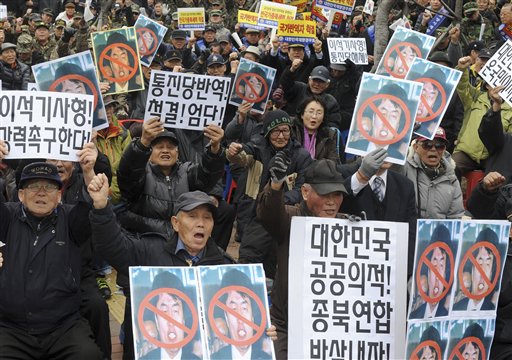
Conservative activists hold defaced photos of leftwing lawmaker Lee Seok-ki of the Unified Progressive Party while shouting slogans during a rally against Lee in front of the Suwon District Court in Suwon, South Korea, Monday, Feb. 17, 2014. AP
SEOUL, South Korea—A South Korean court sentenced a left-wing lawmaker to 12 years in prison and six colleagues to shorter terms Monday for plotting a pro-North Korea rebellion in the event of a war on the Korean Peninsula.
Lee Seok-ki from the small United Progressive Party was arrested in September for allegedly discussing attacks on national infrastructure with 130 colleagues during secret meetings in May. Tensions were especially high between North and South Korea following Pyongyang’s third nuclear test last February and its repeated subsequent threats of nuclear war against Seoul and Washington.
Lee, a first-time lawmaker, has denied the allegations. He said Seoul’s spy service fabricated the charges to divert public attention from an investigation into allegations that its agents were engaged in illegal online campaigning to help President Park Geun-hye, then a ruling party candidate, win presidential elections in December 2012. The spy agency has said its agents were only trying to cope with possible North Korean cyber warfare and pro-North Korea online postings in the South.
The Suwon District Court said in its ruling that Lee’s punishment was inevitable because his plot posed a “substantial and apparent threat” to South Korea. The verdict mentioned strong evidence and what it called consistent and reliable testimony by an informant, described as a former Lee colleague, as the reason for the conviction, according to a court statement.
Lee’s party said it would appeal the ruling to a higher court.
Lee and the six other United Progressive Party members were also convicted of inciting rebellion and praising North Korea. The others received prison terms ranging from four to seven years, according to the court statement.
Lee’s case triggered a fierce political debate and media firestorm. South Koreans are still divided by their recent history, which saw military-backed governments that ruled until the late 1980s use rebellion charges to suppress political rivals.
North Korea called the Lee case a “witch hunt” targeting those who support inter-Korean rapprochement. North Korea cited it as an example of a South Korean confrontational posture that forced it to cancel planned reunions of war-divided families in September. The humanitarian reunion program is to be resumed later this week.
The Korean Peninsula technically remains at war as the 1950-53 Korean War ended with an armistice, not a peace treaty.
RELATED STORIES
Two Koreas to hold second-round of high-level talks
Koreas hold senior-level meeting at border village_